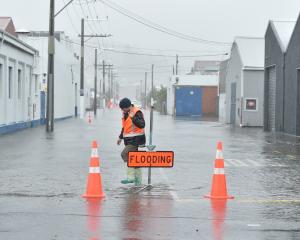He grew up in state care; a life of dislocation and abuse. It is no surprise he ended up in a gang and spent half his life in prison. The miracle is that he has not been back inside for 15 years.
Kimiora [surname withheld] is sitting in the lounge of the Gore home he shares with his caregiver and friend Viv Abernethy. He is talking about what led to him serving 14 years in Paparua Prison, Christchurch, for murder.
''My taniwha was pure hate, anger. F*** the world, f*** the system, f*** everything,'' he says.
''My loyalty, my honour, was to my brothers, to my patch, to the death. That's all I was built for. That's all I believed in.
''That's all I wanted; no more, no less. I didn't even want any money for it. I'll just do the damage.''
The 55-year-old was born in the North Island but has iwi roots in the South. Taken from his home as a child, he spent time in a dozen boys' homes and other institutions during his pre-pubescent and teenage years. Abuse was common, he says.
He joined Black Power on September 28, 1974.
''I was just a gofer. I became the sergeant of arms for the chapter in Christchurch. Then I went to jail for the murder. It was gang-related. It was on another member.''
The transformation began during his final year in prison, when he was enrolled in Olly Ohlson's Mauri Hauora indigenous behavioural change programme.
''The way the system does it, everything they threw at me didn't work. But when Olly came along it was different, because the way of teaching was different. It was done in a cultural way, for who you are as a Maori.
''It made me feel good, because I wanted to know who I was. Nobody had ever asked me who I was. Nobody had asked me what I wanted.''
Whereas other programmes seemed to dictate what to think and appeared time-driven, Mr Ohlson's approach was different, Kimiora said.
''Olly gave me that opportunity; to speak out, to shout out, to sit back and f****ing cry. Why? Because you can feel the feel. Why? Because you can understand it. Why? Because you can identify with it.
''I learnt there was more to life than just being a gang member, a plain criminal or a violent person. It made me realise maybe there is a different way. I never knew that stuff before.''
His voice falters. He dabs at his eyes and wipes his nose.
''I learnt ... a lot more about myself. Not only that, but towards my victims as well. And if you can't identify with them, then you're just bulls****ing yourself, eh.''
He was paroled at the beginning of the millennium. Many thought he would, once again, soon be back inside.
It has not been easy.
On his first morning out, not having seen a sunrise in many years, Kimiora made himself a cup of coffee and sat in front of his accommodation to watch the early day unfold. It was not long before a police car pulled up and he was questioned about a robbery in the neighbourhood.
''You're frightened. You start fighting because you're slammed and tagged. You feel like hiding.''
Prison was, in many ways, the familiar and safe option.
''Jail was never a problem. We knew the rules and how to use it.''
Outside, trying to live in a new way, was the harder path. But he asked for support, and Ms Abernethy responded.
Kimiora moved to Gore. Carving the local runanga building was one element of the new life he was building. Seven years ago, he had an accident that put him in a wheelchair.
''But hey, I can't let it get me down, I have to carry on. So, I go back to the course and go through it again and get a bit more energy or get in touch with reality.
''We call it getting in touch with Ruamoko, who creates earthquakes. So we have to get back in touch with him so we can get a wake-up call, a reality check. Do you get what I'm saying? ''I don't have to think like that anymore. I don't have to be that piece of s*** anymore. I don't have to be an ugly person. Wake up and smell the roses.
''If you knew who I was beforehand, you wouldn't believe you were talking to the f***ing same person.''
Kimiora is informally mentoring a couple of long-term inmates. He is certain Mauri Hauora could be helping many others, both inside and during the crucial transition to life outside prison.
''If you don't have the support, you're not going to make it. ''My taniwha now is to use the energy I have to pump this programme back into the system. I want to get there with Olly. I want to help him.''












